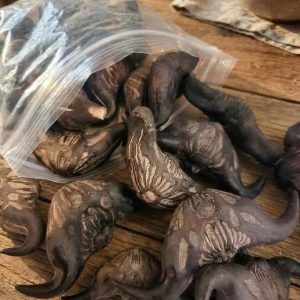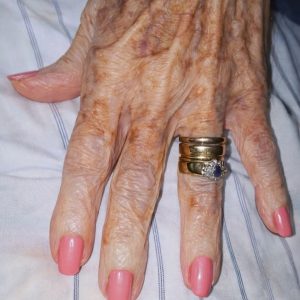When they told us we could finally leave, I should’ve felt relieved.
Instead, I felt numb. My daughter was smiling under her mask, clutching her stuffed bunny and waving to every nurse in sight, but I couldn’t shake the pit in my stomach.
We didn’t have a home to go back to.
Rent lapsed months ago while I was staying at the hospital with her, day and night, waiting through treatments and test results. Her dad was long gone. My job said they “understood”—but they stopped calling two weeks ago. I knew what that meant.
I tried not to show it. I kept smiling for her, brushing her hair back, letting her pick out a balloon from the gift shop even though we couldn’t really afford it.
Then two police officers showed up in the lobby.
For a second, I panicked. I thought maybe it was about the bills, or the paperwork I didn’t finish.
But one of the nurses just gave me a little nod and whispered, “It’s okay. They’re here to help.”
The officers offered to carry our bags, help us to a “temporary placement.” I didn’t know what that meant, and I was too exhausted to ask.
We walked out like any other family—wheels squeaking on the hospital floor, nurses waving goodbye.
But once we were outside, one of the officers leaned in close and handed me a plain white envelope.
He said, “Don’t open it until you’re in the van.”
Inside the van now.
Envelope’s in my lap.
And I just noticed the corner has a name written on it—his name.
“Mommy,” my daughter, Callie, tugged at my sleeve. “Can we get ice cream?”
Her voice was so hopeful, so innocent, that it nearly broke me. How do you explain to a six-year-old that there’s no money left? That the world feels like it’s crumbling around you?
“Maybe later, sweetheart,” I said, forcing a smile. “Right now, let’s focus on where we’re going next, okay?”
She nodded, satisfied for the moment, and turned her attention to the window. The city blurred past as the van hummed along. Every so often, she’d point out something—a dog walking by, a colorful mural painted on the side of a building—and her excitement helped dull the gnawing anxiety in my chest.
But the envelope… it weighed heavy on my mind. Why had the officer been so insistent about not opening it until we were inside the van? And whose name was scrawled in faded ink on the corner? It looked familiar, but my brain was too tired to place it.
Finally, after what felt like an eternity, the van pulled into a quiet residential neighborhood. The houses here were modest but well-kept, their lawns trimmed and flower beds bursting with color. We stopped in front of a small blue house with white shutters. A woman stood on the porch, arms crossed, watching us approach.
“This is your temporary placement,” one of the officers said. “Mrs. Harper will take care of you until further arrangements can be made.”
Temporary placement? What did that even mean? Was this some kind of shelter? Foster care? I didn’t understand, but before I could ask more questions, the officers were already stepping out of the van.
“Wait!” I called after them. “What about—”
“Open the envelope,” the younger officer interrupted gently. He gave me a knowing look before closing the door.
Callie bounced excitedly beside me as Mrs. Harper approached the van. She was older, probably in her late fifties, with silver-streaked hair tied neatly into a bun. Her eyes softened when she saw Callie, and she smiled warmly.
Welcome,” she said, helping us gather our things. “Let’s get you settled.”
Once inside the cozy living room, I sat down on the edge of the couch, Callie curled up beside me. Mrs. Harper disappeared into the kitchen, leaving us alone for a moment. My fingers trembled as I picked up the envelope again. The name on the corner stared back at me: Derek Monroe.
My breath caught. Derek… It couldn’t be. Could it?
I tore open the envelope, heart pounding. Inside was a single sheet of paper and a key attached to a small note card. The note read
This isn’t charity. This is family. Go to 427 Maple Street. Everything will make sense there.”
The address matched the house we were sitting in. Confusion swirled in my head. Who would send this? And why?
I unfolded the letter, scanning the words quickly. Tears filled my eyes as I realized who had sent it—and why.
Derek Monroe was my older brother. We hadn’t spoken in years—not since he moved away after college. Life had pulled us in different directions, and eventually, we drifted apart. I didn’t even know if he still lived in the area.
But according to the letter, he’d been keeping tabs on me. Through mutual friends, social media, whatever means necessary, he’d pieced together my struggles. When he found out about Callie’s illness and my financial collapse, he stepped in.
“I may not have been there for you lately,” the letter read, “but I’m here now. This house belongs to me—it’s paid off, fully furnished, and yours to stay in for as long as you need. No strings attached. Just promise me you’ll let me be part of your lives again.”
I clutched the letter to my chest, overwhelmed. All these years, I thought he’d forgotten about me. But here he was, offering a lifeline when I needed it most.
Mrs. Harper returned with a tray of cookies and lemonade. She set it down on the coffee table and studied my face. “You look like you’ve seen a ghost,” she teased lightly.
“It’s… complicated,” I admitted, handing her the letter. As she read, her expression softened.
“He’s a good man,” she said. “Quiet, keeps to himself, but always willing to lend a hand. He asked me to check in on you both, make sure you’re comfortable.”
Comfortable didn’t begin to describe how I felt. Safe. Hopeful. Loved.
Over the next few days, Derek reached out. At first, it was just texts and calls, checking in to see how we were settling in. Then, one evening, he showed up at the door with pizza and board games. Callie instantly warmed to him, chattering nonstop about her favorite cartoons and showing off her drawings.
Seeing them together filled me with a bittersweet joy. For so long, I’d carried the weight of everything alone. Now, thanks to Derek’s generosity, I didn’t have to anymore.
Months passed, and life slowly began to stabilize. With Derek’s support, I landed a part-time job at a local bookstore. Callie started attending school again, making new friends and thriving despite everything she’d been through. Our bond as a family grew stronger than ever.
One afternoon, as we sat on the porch watching the sunset, Derek turned to me and said, “You know, none of this changes anything between us, right? You’re still my sister. Always have been, always will be.”
I nodded, tears pricking my eyes. “Thank you,” I whispered. “For everything.”
Life isn’t perfect. There are still challenges ahead, and healing takes time. But for the first time in what feels like forever, I feel hopeful. I’ve learned that sometimes, the people you least expect to lean on are the ones who catch you when you fall.
If there’s one lesson I want to share, it’s this: Don’t give up, even when it feels impossible. Reach out. Ask for help. And if someone offers you a hand, take it—you never know where it might lead.
To everyone reading this story, remember: Family isn’t just blood; it’s the connections we nurture and cherish. If this resonated with you, please share and like the post. Let’s remind each other that we’re not alone.


